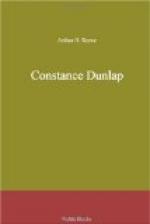As she entered the little living-room she saw a sight which almost transfixed her. Adele was there—lying across a divan, motionless.
Constance bent over. Adele was cold. As far as she could determine there was not a breath or a heart beat!
What did it mean? She did not stop to think. Instantly there flashed over her the recollection of an instrument she had read about at one of the city hospitals, It might save Adele. Before any one knew what she was doing she had darted to the telephone in the lower hall of the apartment and had called up the hospital frantically, imploring them to hurry. Adele must be saved.
Constance had no very clear idea of what happened next in the hurly-burly of events, until the ambulance pulled up at the door and the white-coated surgeon burst in carrying a heavy suitcase.
With one look at the unfortunate girl he muttered, “Paralysis of the respiratory organs—too large a dose of the drug. You did perfectly right,” and began unpacking the case.
Constance, calm now in the crisis, stood by him and helped as deftly as could any nurse.
It was a curious arrangement of tubes and valves, with a large rubber bag, and a little pump that the doctor had brought. Quickly he placed a cap, attached to it, over the nose and mouth of the poor girl, and started the machine.
“Wh-what is it?” gasped Drummond as he saw Adele’s hitherto motionless breast now rise and fall.
“A pulmotor,” replied the doctor, working quickly and carefully, “an artificial lung. Sometimes it can revive even the medically dead. It is our last chance with this girl.”
Constance had picked up the packet which had fallen beside Adele and was looking at the white powder.
“Almost pure cocaine,” remarked the young surgeon, testing it. “The hydrochloride, large crystals, highest quality. Usually it is adulterated. Was she in the habit of taking it this way?”
Constance said nothing. She had seen Muller make up the packet— specially now, she recalled. Instead of the adulterated dope he had given Adele the purest kind. Why? Was there some secret he wished to lock in her breast forever?
Mechanically the pulmotor pumped. Would it save her?
Constance was living over what she had already seen through the detectascope. Suddenly she thought of the strange letter and of the money.
She hurried into the drug store. Muller had already been taken away, but before the officer left in charge could interfere she picked up the carbon sheet on which the letter had been copied, turned it over and held it eagerly to the light.
She read in amazement. It was a confession. In it Muller admitted to Dr. Moreland Price that he was the head of a sort of dope trust, that he had messengers out, like Sleighbells, that he had often put dope in the prescriptions sent him by the doctor, and had repeatedly violated the law and refilled such prescriptions. On its face it was complete and convincing.




